上海牛津9A Unit 6 语法知识点
牛津英语9AUnit6Detectivestories语法知识点总结及练习(附答案)
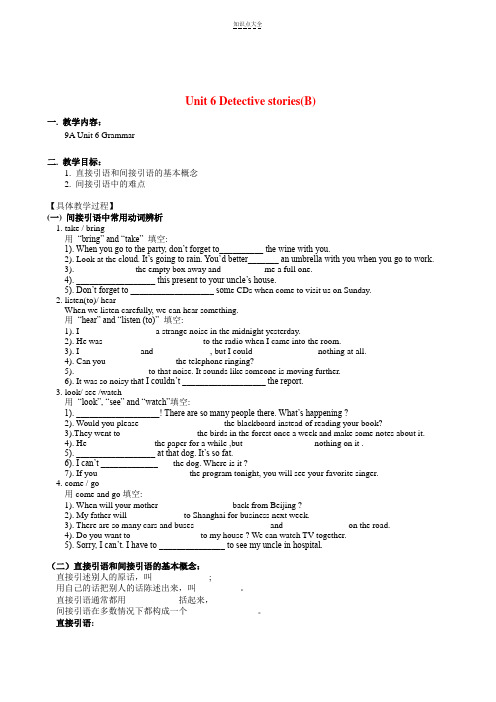
Unit 6 Detective stories(B)一. 教学内容:9A Unit 6 Grammar二. 教学目标:1. 直接引语和间接引语的基本概念2. 间接引语中的难点【具体教学过程】(一) 间接引语中常用动词辨析1. take / bring用“bring” and “take” 填空:1). When you go to the party, don’t forget to__________ the wine with you.2). Look at the c loud. It’s going to rain. You’d better_______ an umbrella with you when you go to work.3). _____________ the empty box away and _________ me a full one.4). __________________ this present to your uncle’s house.5). Don’t forget to ___________________ som e CDs when come to visit us on Sunday.2. listen(to)/ hearWhen we listen carefully, we can hear something.用“hear” and “listen (to)” 填空:1). I_________________ a strange noise in the midnight yesterday.2). He was ______________________ to the radio when I came into the room.3). I _____________ and ____________ , but I could ______________ nothing at all.4). Can you _______________ the telephone ringing?5). ________________ to that noise. It sounds like someone is moving further.6). It was so noisy th at I couldn’t ___________________ the report.3. look/ see /watch用“look”, “see” and “watch”填空:1). ___________________! There are so many people there. What’s happening ?2). Would you please ___________________the blackboard instead of reading your book?3).They went to _________________the birds in the forest once a week and make some notes about it.4). He _______________the paper for a while ,but________________ nothing on it .5). __________________ at that dog. It’s so fat.6). I can’t ________________ the dog. Where is it ?7). If you ____________________ the program tonight, you will see your favorite singer.4. come / go用come and go填空:1). When will your mother ________________ back from Beijing ?2). My father will ____________ to Shanghai for business next week.3). There are so many cars and buses _________________and ______________ on the road.4). Do you want to _______________ to my house ? We can watch TV together.5). Sorry, I can’t. I have to _______________ to see my uncle in hospital.(二)直接引语和间接引语的基本概念:直接引述别人的原话,叫____________;用自己的话把别人的话陈述出来,叫_________。
9A牛津英语unit 6 重要知识点讲解
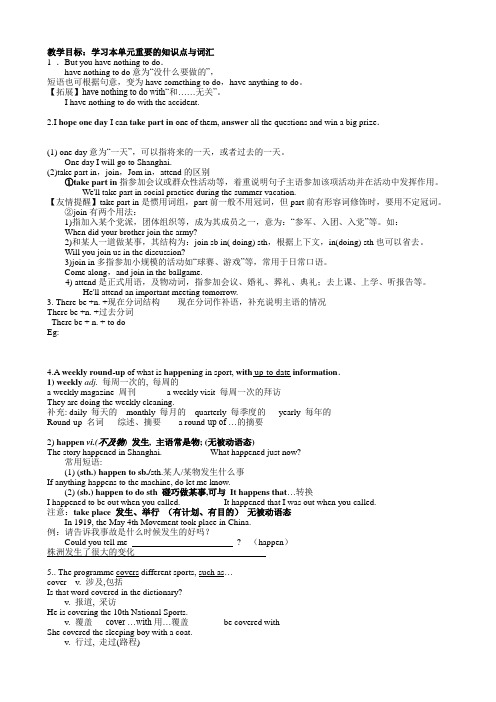
教学目标:学习本单元重要的知识点与词汇1 .But you have nothing to do.have nothing to do意为“没什么要做的”,短语也可根据句意,变为have something to do,have anything to do。
【拓展】have nothing to do with“和……无关”。
I have nothing to do with the accident.2.I hope one day I can take part in one of them, answer all the questions and win a big prize.(1) one day意为“一天”,可以指将来的一天,或者过去的一天。
One day I will go to Shanghai.(2)take part in,join,Jom in,attend的区别①take part in指参加会议或群众性活动等,着重说明句子主语参加该项活动并在活动中发挥作用。
We'll take part in social practice during the summer vacation.【友情提醒】take part in是惯用词组,part前一般不用冠词,但part前有形容词修饰时,要用不定冠词。
②join有两个用法:1)指加入某个党派,团体组织等,成为其成员之一,意为:“参军、入团、入党”等。
如:When did your brother join the army?2)和某人一道做某事,其结构为:join sb in( doing) sth,根据上下文,in(doing) sth也可以省去。
Will you join us in the discussion?3)join in多指参加小规模的活动如“球赛、游戏”等,常用于日常口语。
Come along,and join in the ballgame.4) attend是正式用语,及物动词,指参加会议、婚礼、葬礼、典礼;去上课、上学、听报告等。
】牛津初中英语9A-Unit1--Unit6知识点归纳

牛津初中英语9A_Unit1--Unit6知识点归纳牛津英语9A Unit 31. 你允许他使用你的电话吗?D o you ____________ him to use your telephone?1. 请回答我的问题。
Please____________my question.2. 她头没抬,也不回答。
She didn’t lift her h ead, and made no___________.二、语法点拨1. 动词不定式动词不定式是由“不定式符号to+动词原形”构成的一种非谓语动词结构。
有些动词不定式不带to,动词不定式可以作句子的主语、表语、宾语、定语、补语、状语或单独使用。
不定式保留动词的某些特性,可以有自己的宾语、状语等。
动词不定式和它后面的宾语、状语等一起构成短语,叫作不定式短语。
(1)作主语It is + adj.(形容词)/n.(名词)+ (for sb.) + to-v (动词不定式)It is our duty to try our best to deal with each challenge. 尽力处理每个挑战是我们的职责。
(2)作表语主语+ be + to-v (动词不定式)My dream is to become a policeman. 我的梦想就是当一名警察。
(3)作宾语①主语+ vt. (He prefers to eat rice.②主语+ vt. (Don’t forget to bring your book next time.③主语动词不定式)I find it difficult to remember everything.我觉得记住每一件事是困难的。
④主语动词不定式)I don’t know whether to go there.(4)作定语不定式在句中作定语,置于被修饰的名词或代词之后。
不定式短语作定语和被修饰词之间表示以下关系:①表示将来的动作。
牛津英语9A Unit 6
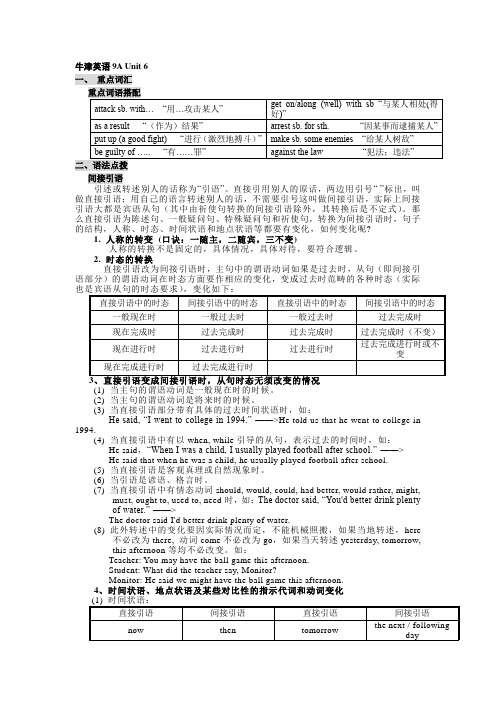
牛津英语9A Unit 6做直接引语;用自己的语言转述别人的话,不需要引号这叫做间接引语,实际上间接引语大都是宾语从句(其中由祈使句转换的间接引语除外,其转换后是不定式)。
那么直接引语为陈述句、一般疑问句、特殊疑问句和祈使句,转换为间接引语时,句子的结构,人称、时态、时间状语和地点状语等都要有变化,如何变化呢?1. 人称的转变(口诀:一随主,二随宾,三不变)人称的转换不是固定的,具体情况,具体对待,要符合逻辑。
2. 时态的转换直接引语改为间接引语时,主句中的谓语动词如果是过去时,从句(即间接引语部分)的谓语动词在时态方面要作相应的变化,变成过去时范畴的各种时态(实际(1) 当主句的谓语动词是一般现在时的时候。
(2) 当主句的谓语动词是将来时的时候。
(3) 当直接引语部分带有具体的过去时间状语时,如:He said, “I went to college in 1994.” ——>He told us that he went to college in 1994.(4) 当直接引语中有以when, while引导的从句,表示过去的时间时,如:He said,“When I was a child, I usually played football after school.” ——>He said that when he was a child, he usually played football after school.(5) 当直接引语是客观真理或自然现象时。
(6) 当引语是谚语、格言时。
(7) 当直接引语中有情态动词should, would, could, had better, would rather, might,must, ought to, used to, need时,如:The doctor said, “You'd better drink plentyof water.” ——>The doctor said I'd better drink plenty of water.(8) 此外转述中的变化要因实际情况而定,不能机械照搬,如果当地转述,here不必改为there, 动词come不必改为go,如果当天转述yesterday, tomorrow,this afternoon等均不必改变。
牛津初中英语9A-Unit1--Unit6知识点归纳

牛津初中英语9A_Unit1--Unit6知识点归纳牛津英语9A Unit 1【小试牛刀】1. 十二点钟了,可他还是睡不着。
It was twelve o’clock, but he was still __________.2. 别弄醒这个孩子,他才睡着。
Don’t ___________ the boy. He fell asleep just now.二、语法点拨1. It is + adj + of sb. + (not) to do sth.It’s +adj.+of sb. to do sth.句型在英语中运用较为频繁,尤其在口语中。
该句型通常表示说话人对客观事件的惊讶、兴奋、懊悔、难过等感叹情绪,其实相当于感叹句。
如:It’s very kind of you to help me. 你能帮助我,真是太好了!该句型与 how 引导的感叹句可以互换,故上句可以改为:How kind it is of you to help me ! 或 How kind of you to help me !在口语中, it is经常被省略, 再如:It’s nice of you to say so.你这样说,真是太好了!可以省略为Nice of you to say so.当然此句改为You’re nice to say so.也可,意思不变。
有时也可用简缩句型It’s + adj.+ of sb. 或That’s + adj. + of sb., 如:It’s wrong of you . 你错了!That’s lovely of her. 她多可爱呀!该句型中用作表语的形容词常见的有如下几类:(1) 表示聪明或愚蠢的形容词,有clever, wise, foolish, stupid, silly等, 如:It’s silly of him to do such a thing. 他竟干出这样的事,真是愚蠢!(2) 表示正确或错误的形容词,有 right, wrong, correct, incorrect 等, 如:It was right of her not to come here. 她没有来这儿,太对了!(3) 表示好坏等品性的形容词,此类词较多,有 good, nice, kind, sweet, friendly, lovely 等, 如:It’s friendly of you to come and see me. 你能来看我,真够朋友!(4) 表示褒义或贬义色彩的形容词,有brave, polite, careless, selfish等,如:It was brave of you to manage to do it. 你居然能做成这件事,真勇敢!【补充】of sb. 的句型通常都可转换为不定式作状语的句子。
牛津9A Unit6 重要短语 句型 语法
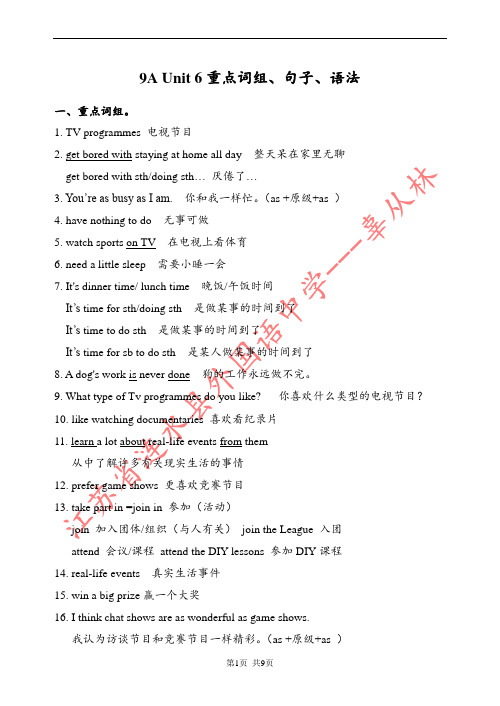
61. take an umbrella with you 随身带把伞 62. have little interest in sth 对….几乎没兴趣
have no interest in sth 对….没兴趣 63. time spent watching TV 用在看电视上的时间 64. most of them 它们中的大部分 65. be a waste of time 浪费时间 66. ask sb for help 向某人寻求帮助 67. call the police at once 立刻报警 68. three men in police uniforms 三个穿着警服的人
keep sb fom doing sth 阻止某人做某事 prevent sb (fom) doing sth 阻止某人做某事 73. write meaningful dialogues 写有意义的对话 mean—meaning—meaningful (adj) 有意义的 meaningless (adj) 无意义的
46. mind feeling scared 介意感到恐惧
mind doing sth 介意做某事
第3页 共9页
47. like films with good stories 喜欢有好故事的电影 48. the best TV programme for sb 适合某人的最好电视节目 49. have 时间看电视 50. complete all her homework quickly 迅速完成她全部的作业 51. find a programme interesting 发现一个节目有趣
牛津版9A chapter 6章节知识点

9A chapter 61.be full of 装满;放满;充满The bottle is full of water.=The bottle is filled with water.2.keep sb. /sth. +adj 使保持某种状态Please keep the door closed.3.make sb. do sth. 使/让某人做某事He often makes his brother cry but this time he is made to cry by his brother.4.move 移动;搬动The desk is too heavy for the boy to move.迁移;搬家We will move into the new house next month.使感动I was moved to tears at the story.5.leave v.离开;剩下;留下;留置;听任;忘记The bus leaves the station in five minutes. May I leave my school bag here?The window was left open. I left my umbrella in the bus.n.许可;休假;告别Can I ask for a three days’ leave?6.have an effect on 对…有影响The book has a great effect on the children.affect v. 动词7.add to/into Please add the relish you like yourself.8.fool v.愚弄;欺骗foolish adj.愚蠢的;傻的n. 傻子You can’t fool me! I don’t believe you. Why are these men so foolish? She was a completely a fool.9.enough pron.足够;充分I have had enough, thank you.adj.充分的;足够的They have enough rooms for everyone.adv.充分地;足够地The room is big enough to hold fifty people.10.kidnpa vt.绑架;诱惑 A rich man was kidnapped on his way home last night.11. go out 出去;出国Let’s go out for a walk.(灯;火)熄灭The fire went out gtadually.(衣着;式样等)不时兴,过时了My clothes go out of date.12.own adj 自己的I saw it with my own eyes.v. 有;拥有The old man used to own a lot of houses.owner n 所有人;物主She is the owner of the house.13.colour v.给…着色n.颜色He coloured the wall white. What colour is it?14.in this way 这样;用这种方法You can do it in this way.in a way 在某种程度上In a way,he was sorry about that.in the way阻碍;造成不便The traffic is busy. You shouldn’t be in the way.by the way 顺便说;顺便问By the way, who won the game?15.welcome v. 欢迎Welcome your friends to my home.adj.受欢迎的You’re a welcome guest.n.欢迎I think they’ll give us a warm welcome.感叹词Welcome to Shanghai. You’re welcome. 不客气16.at times 每次;一次The boat can take six people at a time.at that time “那时”常用于一般过去时或过去进行时They were on an island at that time.17.take off 脱下put on 穿上起飞The plane took off five minutes ago.18.escape 常与from或out of 连用Two of the prisoners have escaped from the prison.escape+n./v-ing There is no way to escape doing the work.19.free①自由的The old lady leads a free life and never troubles much about anything.②免费的We enjoy free treatment care.③空闲的I’m free on Saturday.④未被占用的Have they any rooms free?20.belong to 属于This car belongs to me. Who does this TV set belong to ?21. burst into 突然发生She burst into tears.=She burst out crying.burst out doing sth. 突然发生22.at the beginning of 在…之初Please read the text from beginning to end.He will go to England at the beginning of next month.23.on one’s own 独自地;主动地He did the work on his own.24.不可数名词数量时,常用“数词+单位名词+of +不可数名词”a piece of paper two pieces of paper a teaspoon of soup three teaspoons of soup25.take①拿;握住;抓住The mother took her child by the hand.②乘坐;搭(车,船)We took the bus to Beijing.③吃;喝;服用You must take the medicine three times a day.④花费(时间)需要;持续How long does the flight take?26.drop v. 落下;掉下The girl dropped the cup.drop by 请问;拜访He often drops by Tom’s .27.space 间隔;太空;空间He was the first man to walk in outer space.28.provide sb. with sth.=provide sth. for sb. 为某人提供某物Mr Smith provided food for us.=Mr Smith provided us with food.随堂测试1.—May I have another cake?—You’d better not. You shouldn’t go swimming on a________stomach.a.hotb.hungryc.fatd.full2.Look out! The cup is ______hot water.a.full ofb.fill withc.fulld.filled3.The earth is out home.We must______the land, air and water clean.a.getb.letc.keepd.take4.The heavy snowstorm made the mountain climbers_________halfway.a.stopb.to stopc.stoppingd.stopped5.Lin is going to________from Tai’an to Dalian after high school.a.startb.movec.setd.take6.After the earthquake, we heard of a lot of_________stories, and all of us were deeply _______.a.moving; movedb.moving;movingc.moved;movingd.moved;moved7.—Thanks for your wonderful dinner.I have to go now.—It’s raining hard. Don’t _______until it stops.a.arriveb.stayed.leave8.—Where is my handbag?—Maybe you have________it in the shoe shop.a.gotb.forgottenc.thrownd.left9.The boy read the article_______and found something important in it.a.careful enoughb.carefully enoughc.enough carefuld.enough carefully10.Look at the flowers! They are in different ________;red,yellow, pink….a.coloursb.sizesc.pricess11.—I want to go to different places,but I don’t know the _______.—A map is helpful,I think.a.priceb.wayc.timed.ticket12.—I’ve never had such a wonderful time.Thank you for asking me.—_________.a.Good jobb.That’s itc.That’s rightd.You’re welcome13.—__________has your uncle been to Canada?—Only twice.a.How many timesb.How oftenc.How longd.How soon14.The plane from Shanghai to Paris will ________in an hour.a.take upb.take awayc.take outd.take off15.Everyone knows that Taiwan belongs ________China.a.forb.toc.withd.about16.—I thought you had_________English.—No.It has been useful in my work.a.studiedb.droppedc.falledd.passed17.He_______us with the information that we needed.a.toldb.gavec.providedd.offered 答案:DACAA ADDBA BDADB BC。
牛津9Aunit6知识点词组句子归纳教学文案

9AU6知识点梳理Welcome to the unit1. boring 令人无聊的amazing 令人惊奇的sur prising令人惊讶的bored 人感到无聊的amazed 人感到惊奇的surprised人感到惊讶的exciting 令人兴奋的interesting令人有趣的excited 人感到兴奋的interested人感到有趣的2.as +adj.或adv原级+as 和...一样...sleepy (adj.) 欲睡的feel sleepy3.sleep(n.或v)asleep (adj.) 睡着的fall asleepReading1.daily (adj.) 每日的weekly (adj.) 每周的monthly(adj.)每月的yearly(adj.)每年的2.up-to-date 最新的=the latest=the newest, 其反义词是out-of-date.3. a number of “许多,大量”,修饰可数名词的复数形式,相当于many,动词用复数the number of “…的数量”,动词用单数4.cover:①vt. “报道” will be covered live 被动,一般将来时的被动结构是:will be +done②vt. “包括”= include5.动词或动词短语修饰名词:①主动关系,用doing形式The road connecting NJ to JR is busy.②被动关系,用done形式I like the songs sung by Jay.6. be full of … = be filled with... 注意介词7. on Earth =in the world 世界上vt. “介意”, mind doing mind sb./ sb’s doing8. mindn. “大脑、精神” in my mind “在我心中” on my mind “挂在心上”9.such as = like10.this week’s programme “本周的节目” ,在时间后加’s ,如:today’s newspapersthis month’s magazine等。
牛津初中英语9A-Unit1--Unit6知识点分部分梳理解读

牛津初中英语9A_Unit1--Unit6知识点分部分梳理UNIT 1Welcome1.bring bring sb. sth=bring sth. to sb. (与take比较2.Worry about = be worried about3.Say, talk, tell,,speakSay (vi. 强调说话内容Talk (vi. talk to sb. about sth.Tell 告诉。
双宾语 tell sb. sth.Speak 说某种语言:正式的演讲,演说4. shoul d①(shall过去时)②情态动词,“应该”,用于第一人称Shouldn’t 不应该5. sb. be familiar with sth.=sth is familiar to sb 某人对某物熟悉6. recommend sb. sth.=recommend sth. to sb. 向某人推荐某物Recommend sb. to do sth. 建议某人做某事7. join +党派,团体(加入并成为一员)Join in 参加某项正在进行的某项活动=take part inJoin sb. in sth. 加入做某事的行列Reading1. divide…into… 把……分成divide…from….把……与……分开2. at times = sometimes 有时3. patient (adj.←→impatient (n. 病人4. give up sth.give up doing sth. = stop doing sth.5. too much 太多 + 名词 much too太 + 形容词6. pay attention to sth. 注意,重视7. be good at = do well in 擅长←→ be weak/bad in8. others ①some… others 一些……另一些②some…the others 一些……其余的(余下的全部)9. differently; different (be different from; difference10. try to do sth. 尽力做某事; try doing 试着做Vocabulary1. spend, pay, cost ,takespend (主语为人spend…(in doing sth. 花费……做某事spend… on sth 在某物上花费……pay(主语人)pay money for sth. ;pay sb. some moneycost(主语物)sth. cost sb. some moneytake. It takes sb. some time to do sth. 做某事花费某人……时间2. explain sb. sth. = explain sth. to sb. 向某人解释某事3. show off 炫耀,卖弄(代词放中间)Grammar1. It is + adj.(品质 + of sb. + (not to sth.(careless, clever, foolish, good, kind, nice, silly, generous, confident 2. It is + adj. (不定式的特征+ for sb. + (not to to do sth.(easy, different, hard, important, necessary, interesting, impossible 3. sb. be (not + adj. + enough + to do sth. 某人(不足够……做某事与so…that…; too…to…4. at all times 随时,永远(常在句末)5. have sth. done 使某事被做; have sb. to do sth. 让某人去做Skills1. have success in (doing sth. = succeed in (doing sth.adj. successful2. have problems with sth.=have problems (difficulty/trouble in doing sth.3. make predictions 做预测4. have fun (in doing sth. 做某事开心5. come up with 找到,提出(解答)6. be afraid of doing 害怕做 be afraid to do 因害怕而不敢做7. mind +doingUNIT 2Welcome1. there’s nothing wrong with…=there isn’t anything wrong with…(anything, something,everything,nothing, somebody, anybody, somewhere, anywhere 形容词位于这些不定代词后2. sth. looks +adj. (good on sb 某人穿……很(好看)Reading1. sleepy, asleep, sleep2. be good/ bad for 对……有好处︱坏处be goo to 对……亲切 be good at3. sad, sadness, sadly4. cheer sb. up=cheer sb. up 使……振奋起来,高兴起来5. remind : remind sb. of sth. 提醒某人某事remind sb. (not to do sth.6. have difficulty (in doing sth. = have difficulty with sth.7. make a decision to do sth. = decide to do sth.Grammar1. would rather A than B 宁愿A而不愿Bwould rather do sth. than do sth. 宁愿做……而不愿做……2. prefer A to B 比起A更喜欢Bprefer to doing to doingprefer to do than to do3. someone/ somebody 多用于肯定句;用于疑问句中,表示建议,请求anyone/ anybody 多用于否定:任何人no one /none 没有人4. wonder (vi =want to know +if/ whether(n. 奇观 adj. wonderfulSkills1. promise (sb. to do 答应(某人)做某事promise (sb. that promisesb. sth. = promise sth. to sb.n. make a promise 许下诺言2. advise (doing sth. 建议(做)某事advise sb. (not to sth. 建议某人(做)某事n. advice (不可数 give advice to sb. on sth. 在某事上给某人建议3. how about = what about ……怎么样4.a pair of (动词用单数 + 复数5. a little bit of + adj. 有点6. because, since, as , forBecause, 表直接原因,从句时全句重心since, 侧重主句,表示显然的或已知的原因as, 主从句并重for, 表附加或推断的理由,引导从句用”,”隔开,for 不可放句首UNIT 3Reading1. deal with sth. 处理某事 deal with sb. 对待某人what to do with how to do with2. have no choice but to do sth. 别无选择,只能做vi. choose+ n. /to do3. stay up 熬夜4. accept(主观上的领受,接受←→refusereceive 客观上5. hand in sth. (如sth. 为代词则放中间hand out 分发6. hardly,几乎不,表否定意义hard. adj. 硬的,困难的adv. 努力地,猛烈地7. worth be worth sth./ doing sth.8. be of great value = be very valuable 很有价值be of + 抽象名词 = be +形容词(interest/ importance)9. hear from=get/receive a letter from 收到来信hear of (about 听说,听说过10. allow sb. to do sth.allow doing sth.11. be strict with sb. 对某人严格be strict in sth 在……方面严格12. from time to time =at times = sometimes有时13. either, 两者之一;both两者都;all三者及以上都14. also,(较正式);too, as well,(较口语)Grammartruth; to tell the truth 说实话adj. true; trulyskills1. be proud of 为……自豪2. It’s my pleasure/ My pleasure/ It’s a pleasure 不用谢3. suffer from (doing sth. 因(做)……而受折磨4. though (引导让步状语; although(必须用于句首)5. cause of/ reason for ……的原因UNIT 4Welcome1. far (adv. 极,太,修饰adj. far too busyfar (adj. 远的 far from2. send sth. out / send out sth. 发出Send off 寄出 send for 派人去请 send up 发射Grammar1. a number of = numbers of 许多+可数名词复数the number of ……的数量谓语用单数2. live 现场直播的;活的 v. 生活living 有生命的; alive 活着的; lively 活泼的3. direct v. 导演 adj. 直接的; adv. Directly; director4. find + sb./sth. + adj. 发现某人/某物处于某种状态65. dead 死的(状态); die s死(瞬间) n. death 死亡6. be full of = be filled with 充满……的Vocabulary1. prize. win a prize 获奖2. take part in 参加(活动、会议)attend (较正式join 组织 join in 正在进行的活动Grammar1. between…and … 在两者之间among 在多者之间during 在一段时间之中2. from…to 从……到……3. before 在……之前 after 在……之后until 直到……为止not…until 直到……才3. while 与 aswhile 主从句都为延续性动作,且共同存在as 从句为延续性动作,主句为瞬间动作(还有因为得意思)Skill1. rather 相当 + adj.+n. a rather +n. 或rather a/an+n.quite a /an2. not at all 一点也不UNIT 5Welcome1. good take 好镜头2. Stand by! 做好准备!Reading1. all-time adj. 空前的,创记录的。
牛津英语9A U6知识点 校对版

9A Unit 6 TV ProgrammesComic strip1. There are always famous people on these shows talking about their lives.1.there be +主语+doing sth有....在做某事There is a boy crying in the street. 有一个在街上哭的男孩。
拓展:1.there be+主语+过去分词有....被....There is a student called Jack in our class. 在我们班有一个叫杰克的学生。
2.there be+主语+不定式有...要做There are a lot of things to do today. 今天有许多事要做。
2.show n.表演,(广播或电视)节目,展览on show在展出What television shows do you usually watch? 你通常看什么电视节目?2. Eddie,aren’t you getting bored with staying at home all day?该句是一个否定疑问句句式。
否定疑问句的句式为“助动词/情态动词/be动词与not的缩写形式+主语+谓语+其他?”,通常意为“难道……不/没有……吗?”,所表示的意思通常有:(1)表示惊讶或提出反问。
如:Isn’t he a good student? 难道他不是一名好学生吗?(2)表示试探性建议或有礼貌的请求。
如:Can’t you ask your parents for help? 你不能向你父母寻求帮助吗?(3)表示责备、批评、抱怨。
如:Can’t you be more careful? 难道你就不能更细心点儿吗?Why are you late again? Haven’t I told you? 你为什么又迟到了? 难道我没有告诉过你吗? (4)表示征询对方对某人或某事的看法。
牛津初中英语9A_Unit1--Unit6知识点归纳(完整资料).doc

【最新整理,下载后即可编辑】牛津初中英语9A_Unit1--Unit6知识点归纳牛津英语9A Unit 11. 十二点钟了,可他还是睡不着。
It was twelve o’clock, but he was still __________.2. 别弄醒这个孩子,他才睡着。
Don’t ___________ the boy. He fell asleep just now.二、语法点拨1. It is + adj + of sb. + (not) to do sth.It’s +adj.+of sb. to do sth.句型在英语中运用较为频繁,尤其在口语中。
该句型通常表示说话人对客观事件的惊讶、兴奋、懊悔、难过等感叹情绪,其实相当于感叹句。
如:It’s very kind of you to help me. 你能帮助我,真是太好了!该句型与how 引导的感叹句可以互换,故上句可以改为:How kind it is of you to help me ! 或How kind of you to he lp me !在口语中, it is经常被省略, 再如:It’s nice of you to say so.你这样说,真是太好了!可以省略为Nice of you to say so.当然此句改为You’re nice to say so.也可,意思不变。
有时也可用简缩句型It’s + adj.+ of sb. 或That’s + adj. + of sb., 如:It’s wrong of you . 你错了!That’s lovely of her. 她多可爱呀!该句型中用作表语的形容词常见的有如下几类:(1) 表示聪明或愚蠢的形容词,有clever, wise, foolish, stupid, silly等,如:It’s silly of him to do such a thing. 他竟干出这样的事,真是愚蠢!(2) 表示正确或错误的形容词,有right, wrong, correct, incorrect 等,如:It was right of her not to come here. 她没有来这儿,太对了! (3) 表示好坏等品性的形容词,此类词较多,有good, nice, kind, swee t, friendly, lovely等, 如:It’s fri endly of you to come and see me. 你能来看我,真够朋友!(4) 表示褒义或贬义色彩的形容词,有brave, polite, careless, selfish等,如:It was brave of you to manage to do it. 你居然能做成这件事,真勇敢!【补充】of sb. 的句型通常都可转换为不定式作状语的句子。
牛津英语9A Unit6 知识点归纳
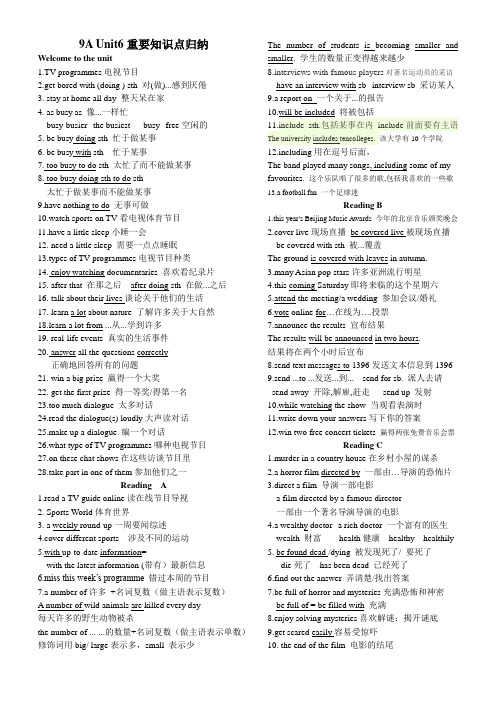
9A Unit6重要知识点归纳Welcome to the unit programmes电视节目2.get bored with (doing ) sth 对(做)...感到厌倦3. stay at home all day 整天呆在家4. as busy as 像...一样忙busy-busier--the busiest busy--free空闲的5. be busy doing sth 忙于做某事6. be busy with sth 忙于某事7. too busy to do sth 太忙了而不能做某事8. too busy doing sth to do sth太忙于做某事而不能做某事9.have nothing to do 无事可做10.watch sports on TV看电视体育节目11.have a little sleep小睡一会12. need a little sleep 需要一点点睡眠13.types of TV programmes电视节目种类14. enjoy watching documentaries 喜欢看纪录片15. after that 在那之后after doing sth 在做...之后16. talk about their lives谈论关于他们的生活17. learn a lot about nature 了解许多关于大自然18.learn a lot from ...从...学到许多19. real-life events 真实的生活事件20. answer all the questions correctly正确地回答所有的问题21. win a big prize 赢得一个大奖22. get the first prize 得一等奖/得第一名23.too much dialogue 太多对话24.read the dialogue(s) loudly大声读对话25.make up a dialogue 编一个对话26.what type of TV programmes哪种电视节目27.on these chat shows在这些访谈节目里28.take part in one of them参加他们之一Reading A1.read a TV guide online读在线节目导视2. Sports World体育世界3. a weekly round-up一周要闻综述4.cover different sports 涉及不同的运动5.with up-to-date information=with the latest information (带有)最新信息6.miss this week’s programme 错过本周的节目7.a number of许多+名词复数(做主语表示复数)A number of wild animals are killed every day每天许多的野生动物被杀the number of ... ...的数量+名词复数(做主语表示单数)修饰词用big/ large表示多,small 表示少The number of students is becoming smaller andhave an interview with sb--interview sb 采访某人9.a report on 一个关于...的报告12.including用在逗号后面,The band played many songs, including some of my favourites. 这个乐队唱了很多的歌,包括我喜欢的一些歌13.a football fan 一个足球迷Reading B1.this year's Beijing Music Awards 今年的北京音乐颁奖晚会2.cover live现场直播be covered live被现场直播be covered with sth 被...覆盖The ground is covered with leaves in autumn.3.many Asian pop stars许多亚洲流行明星4.this coming Saturday即将来临的这个星期六5.attend the meeting/a wedding 参加会议/婚礼6.vote online for…在线为….投票7.announce the results 宣布结果The results will be announced in two hours.结果将在两个小时后宣布8.send text messages to 1396发送文本信息到13969.send ...to ...发送...到... send for sb. 派人去请send away 开除,解雇,赶走send up 发射10.while watching the show 当观看表演时11.write down your answers写下你的答案12.win two free concert tickets 赢得两张免费音乐会票Reading C1.murder in a country house在乡村小屋的谋杀2.a horror film directed by 一部由…导演的恐怖片3.direct a film 导演一部电影a film directed by a famous director一部由一个著名导演导演的电影4.a wealthy doctor--a rich doctor 一个富有的医生wealth 财富health健康healthy healthily5. be found dead /dying 被发现死了/ 要死了die死了---has been dead 已经死了6.find out the answer 弄清楚/找出答案7.be full of horror and mysteries充满恐怖和神密be full of = be filled with 充满8.enjoy solving mysteries喜欢解谜;揭开谜底9.get scared easily容易受惊吓10. the end of the film 电影的结尾Reading D1.a one-hour documentary 一个一小时的记录片2.take a close look at…近距离地看一看3.the life of tigers in India在印度老虎的生活4.face danger 面临危险face to face 面对面5.how much danger多少危险6.unless humans stop hunting them除非人类停止猎杀它们7.hunt them for their fur and bones猎取他们毛和骨8.feel sad about it 对此感到悲伤9.see scenes from India 看见来自印度的风光10.one of the few places 较少的地方之一11.win an award for 因…而获奖12. say sth in a low voice 用低声说某事13.send out later稍后发出14.cry for help 尖叫求助15. Jack doesn’t mind feeling scared杰克不介意感到恐惧Grammarplete ...quickly 快速完成....2.introduce ...to... 向。
牛津英语9AUnit6TVprogrammes单元知识点归纳
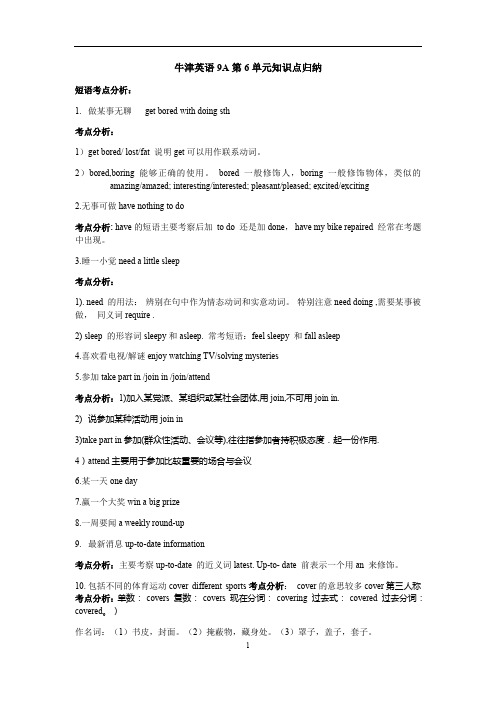
牛津英语9A第6单元知识点归纳短语考点分析:1.做某事无聊get bored with doing sth考点分析:1)get bored/ lost/fat 说明get可以用作联系动词。
2)bored,boring 能够正确的使用。
bored 一般修饰人,boring一般修饰物体,类似的amazing/amazed; interesting/interested; pleasant/pleased; excited/exciting2.无事可做have nothing to do考点分析: have的短语主要考察后加to do 还是加done,have my bike repaired 经常在考题中出现。
3.睡一小觉need a little sleep考点分析:1). need 的用法:辨别在句中作为情态动词和实意动词。
特别注意need doing ,需要某事被做,同义词require .2) sleep 的形容词sleepy和asleep. 常考短语:feel sleepy 和fall asleep4.喜欢看电视/解谜enjoy watching TV/solving mysteries5.参加take part in /join in /join/attend考点分析:1)加入某党派、某组织或某社会团体,用join,不可用join in.2)说参加某种活动用join in3)take part in参加(群众性活动、会议等),往往指参加者持积极态度.起一份作用.4)attend主要用于参加比较重要的场合与会议6.某一天one day7.赢一个大奖win a big prize8.一周要闻a weekly round-up9.最新消息up-to-date information考点分析:主要考察up-to-date 的近义词latest. Up-to- date 前表示一个用an 来修饰。
上海牛津9A Unit 6 语法知识点

9A Unit 6 语法知识点词汇1. protect vt. 保护,保卫某人/ 某事物如:You need warm clothes to protect you against the cold. 你需要穿暖些以免着凉。
2. innocent adj. 无辜的,清白的如:They have imprisoned an innocent man. 他们监禁了一个无辜的男子。
3. detective n. 侦探如:Sherlock Holmes is a famous detective in stories. 福尔摩斯是小说中一个著名的侦探。
→adj. detective 侦探的如:He works in a a detective agency. 他工作在一个侦探事务所。
4.recent adj. = latest 最近的如:I want a recent issue of the Xinmin Review. 我想要最近一期的《新民周刊》。
→adv. recently 最近,进来如:I haven’t written to my mother recently. 近来我一直没写信给我母亲。
5. case n. 案件如:The policeman is telling us a recent case that he dealt with last week.那位警察正给我们讲上星期他处理过的最近的一桩案件。
【短语】①in case 如果,以防万一如:You’d better take the keys in case I’m out. 你最好带上钥匙以防我不在家。
Take along an umbrella, just in case. 随身带一把伞,以防万一。
②in case of + n.如:Call this number in case of emergency. 万一发生意外,就拨打这个号码。
9A-Unit-6-知识点梳理

九年级第一学期牛津英语知识点梳理Unit 6 Protecting the innocent(其中标“* ”的是非考纲词汇)中考考纲词汇1)detective n. [di'tektiv] 侦探2)recent a. ['ri:snt] 最近的,近来的recently ad. ['ri:səntli] 最近3)case n. [keis] 案例;案子,箱,盒4)safe n. [seif] 保险箱a. 安全的save v. 拯救,节约safely adv. 安全地safety n. 安全5)conclusion n. [kən'klu:ʃən] 结论;结束*conclude v. [kən'klu:d] 结束,作结论,推断6)discover v. [♎♓♦✈❖☜]发现;看出非考纲单词7)*crime n. [kraim] 犯罪,罪行, 罪恶8)*innocent a. ['inəsnt] 清白的,无罪的9)*purchase v. ['pə:tʃəs] 买,购买10)*clue n. [klu:] 线索11)*earring n. ['iəriŋ]耳环12)*mud n. [mʌd] 泥,泥浆;泥泞muddy a. ['mʌdi] 泥泞的,污的,肮脏的13)*spotlessly ad. ['spɔtlisli] 极清洁地;洁白无瑕地(=completely) *spot n. [spɔt]污点,地点,斑点*spotless a. ['spɔtlis] 无脏污的,无缺点的14)*deny v. [di'nai] 否认;拒绝(deny doing sth.)15)*necklace n. ['neklis] 项链16)*proof n. [pru:f]证据prove v. [pru:v] 证明,查验,显示17)*admit v. [əd'mit] 承认(admit doing sth.)18)*suspect n. [səs'pekt] 嫌疑犯19)*insurance n. [in'ʃuərəns] 保险20)*jail n. [dʒeil] 监狱21)*guilty a. ['gilti] 犯罪的;有罪的*guilt n. [gilt] 罪行,内疚22)*arrest vt. [☜❒♏♦♦] 逮捕, 拘留, 吸引23)*pause vi. [☐] 暂停, 中止, 停顿, 踌躇24)*mystery n. [ ❍♓♦♦☜❒♓] 神秘, 神秘的事物25)*murder n. [ ❍☜♎☜] 谋杀, 凶杀中考考纲词组26)dealt with 处理27)show sth. to sb. = show sb. sth. 给某人看某物28)look for 寻找29)break into 闯入30)be no longer (= be not…any longer ) 不再是31)in the end (=at last/ immediately) 最终32)protect ….. from 保护……免受……33)as well (=,too) 也非中考考纲词组34)*write an art icle on… 写一篇关于… …的文章35)*a recent case 最近一个案子36)*live alone 独自居住*feel lonely 感到孤独37)*purchase sth. for some money 花…钱买了…38)*report the theft 报告这个偷窃案。
- 1、下载文档前请自行甄别文档内容的完整性,平台不提供额外的编辑、内容补充、找答案等附加服务。
- 2、"仅部分预览"的文档,不可在线预览部分如存在完整性等问题,可反馈申请退款(可完整预览的文档不适用该条件!)。
- 3、如文档侵犯您的权益,请联系客服反馈,我们会尽快为您处理(人工客服工作时间:9:00-18:30)。
9A Unit 6 语法知识点词汇1. protect vt. 保护,保卫某人/ 某事物如:You need warm clothes to protect you against the cold. 你需要穿暖些以免着凉。
2. innocent adj. 无辜的,清白的如:They have imprisoned an innocent man. 他们监禁了一个无辜的男子。
3. detective n. 侦探如:Sherlock Holmes is a famous detective in stories. 福尔摩斯是小说中一个著名的侦探。
→adj. detective 侦探的如:He works in a a detective agency. 他工作在一个侦探事务所。
4.recent adj. = latest 最近的如:I want a recent issue of the Xinmin Review. 我想要最近一期的《新民周刊》。
→adv. recently 最近,进来如:I haven’t written to my mother recently. 近来我一直没写信给我母亲。
5. case n. 案件如:The policeman is telling us a recent case that he dealt with last week.那位警察正给我们讲上星期他处理过的最近的一桩案件。
【短语】①in case 如果,以防万一如:You’d better take the keys in case I’m out. 你最好带上钥匙以防我不在家。
Take along an umbrella, just in case. 随身带一把伞,以防万一。
②in case of + n.如:Call this number in case of emergency. 万一发生意外,就拨打这个号码。
③in case that + 从句6. theft n. 行窃,盗窃如:He was sent to prison for theft. 他因盗窃(罪)被判入狱。
I told the police about the theft of my car. 我向警方报案我的汽车被盗了。
The theft happened in our neighbourhood last night. 昨晚我们小区发生了行窃。
7. clue n. 线索,提示如:The police are going to his house to look for clues. 警察正要去他家寻找线索。
The detective was clever at spotting clues. 侦探擅长于发现线素。
【短语】not have a clue 毫无头緒,一点也不知道如:-- What's his name ? -- I haven’t a clue.8. admit v. 承认如:John admitted breaking the window in the library. 约翰承认打碎了图书馆的窗户。
He never admits that he is wrong.9. suspect n. 犯罪嫌疑人如:As a suspect, he is being questioned by police. 他被当作犯罪嫌疑人正在接受警方审讯。
注意:suspect作名词时,重音在第一个音节上,作动词时,重音则在第二个音节上。
suspect v. 猜想,料想;怀疑如:Tom wasn’t at college today. I suspect that he's ill. 汤姆今天没来学校。
我想他是病了。
They suspect John of stealing the money. 他们怀疑约翰偷了钱。
10. question v. 询问,审问,盘问如:What right have you to question me? 你有什么权利盘问我?The police questioned him about the stolen car. 警方询问了他关于被盗汽车的情况。
11. insurance n. 保险(无复数形式)如:She works in an insurance company. 她在一家保险公司工作。
Car insurance is expensive in our city. 我们城市的汽车险很貴。
→v. insure 给……保险,投保;确保如:My house is insured against fire. 我的房子保了火险。
12. guilty adj. 有罪的如:The death of his patient made him feel guilty. 他病人的死使他觉得有罪恶感。
He has been guilty of a crime 他犯了罪。
短语1. deal with 处理,对付,对待如:He's a difficult man. Nobody quite knows how to deal with him. 他是个难缠的人。
没人真正知道该如何对付他。
My secretary will deal with my business letters while I’m away. 在我外出期间,秘书会处理我的商务信件。
This chapter deals with detectives and crimes. 本章是讲述侦探和犯罪的。
注意:区别deal with和do withdeal with与how连用,do with与what连用。
如:Would you please tell me how to deal with these old magazines ?Would you please tell me what to do with these old magazines ? 你能告诉我该如何处理这些旧杂志吗?2.lock…in…把……锁进……里面如:John has locked his diary in the drawer of his desk. 约翰把他的日记锁在了写字台的抽屉里。
Please lock all the jewellery for me in the safe in Shanghai Bank.请帮我把所有这些首饰都锁进上海银行的保险箱里。
3. jump to conclusions 妄下结论如:Don’t jump to any conclusions. Please read the case again. 不要妄下结论。
请再好好读读这个案例。
4. break into 闯入,破门而入如:They broke into the bank and stole a lot of money.The thieves broke into the office and stole some money.【拓展】break down 停止运转,抛锚如:We’re late because our car broke down.break off 折断如:He broke off a piece of chocolate for me. 他掰下一块巧克力给了我。
5. be behind bars = be in jail 在狱中如:He was caught by policemen three years ago and now he is behind bars. ·6.instead of = in place of 代替作状语,后接名词、代词、动名词或介词短语如:He goes to school by bus instead of on foot.He's been playing football all afternoon instead of studying.Can you come at 7:30 instead of 8:00 ?We advise discussion in place of argument.9A Unit 6 ExerciseI. Read and choose the best answer.(选择最恰当的答案)(20分)( ) 1. Nowadays, Pacific Islands are very popular with tourists from all over the world.A. /B. theC. aD. an ( ) 2. Tony is going on the picnic with friends.A. two little otherB. other two littleC. two other littleD. other( ) 3. Everyone except Tom and John there when the meeting began.A. areB. isC. wereD. was ( ) 4. That place is not interesting at all. of us wants to go there.A. NeitherB. BothC. AllD. Some( ) 5. The teacher and writer asked to make a speech at the meeting.A. isB. wasC. areD. were ( ) 6. I’m sorry you the train, it just now.A. have missed, leftB. missed, has leftC. failed in, had leftD. are missing, was leaving ( ) 7. The little boy looks . He is my teacher’s son.A. lovelyB. carelesslyC. happilyD. sadly ( ) 8. Since he got a job, he hasn’t asked his parents for money.A. greatlyB. very muchC. badlyD. ever( ) 9. The box is so heavy that it easily.A. can’t riseB. can’t raiseC. can’t be ri senD. can’t be raised( ) 10. Mary did in the physics exam and I did even .A. badly, worseB. badly, alsoC. worse, worseD. bad, bad( ) 1. Jack is quick sure of himself that he can win the first price in the 100-meter dash.A. confidentB. nervousC. almostD. lovely( ) 12. He tried to get up earlier so as to catch the first train.A. in case toB. with the hope toC. in order toD. in order that( ) 13. The man in red is nearly eighty but still busy and lively.A. youngB. dullC. activeD. foolish ( ) 14. It rarely snows in Shanghai.A. oftenB. alwaysC. neverD. seldom( )15. Doctor Li will call you if he next week.A. arrivesB. gets toC. reachesD. arrives in( )16. I’d like to know .A. when will he give back the pen.B. whether he has received higher education.C. that he has been busyD. whether will she join our English Evening( )17. A lot of customers the dirty food in the restaurant near Xin Feng Estate last week.A. complained aboutB. were fond ofC. gave upD. ran out of( )18.A: Do you know ?B: Sorry, but if he back, I you know as soon as possible.A. when will he be back; comes, will letB. when he will be back, comes, letC. what time will he back. will come, will letD. what time he will be back, comes, will let( )19. − You look so beautiful today.− .A. No, I am not beautiful.B. Thank you.C. Not at all.D. I’m not so beautiful as you.( )20. —Thank you for coming to see me off.—A. I’m fine.B. My duty.C. Nice to see you off.D. My pleasure.II. Fill in the blanks with the words in their proper forms.(用括号中所给的单词的适当形式填空)(10分)1. The are Lily and Lucy’s. (watch)2. He has gone to the office. (teacher)3. English is used all over the world. (wide)4. We are thankful for all your help. (true)5. The little girl plays piano . (wonder)6. Alice bought 2 hula hoops instead of two of bread. (loaf)7. Don't take it away. It is an test paper. (correct)8. Can you give us a full of this accident? (describe)9. Too much homework is really to students. (pain)10. I know these over there quite well. (fish )III. Rewrite the sentences as required. (按要求改写句子) (10分)1. The schoolbag on the desk belongs to my sister. (对划线部分提问)schoolbag to your sister?2. It was unlucky of Liu Xiang to be unable to run at the 2008 Beijing Olympic Games.(改为感叹句)it was of Liu Xiang to be unable to run at the 2008 Beijing Olympic Games!3. Please don’t make so much noise in the reading room. (改为反意疑问句)Please don’t make so much noise in the reading room, ?4. Ben went out to play football after he finished his homework. (保持句子原意)Ben go out to play football he finished his homework.5. Make sure that you look after your things well when you are on a bus or a train. (改为被动语态)Make sure that your things are after when you are on a bus or a train.Part 2 Reading and Writing(第二部分阅读和写话)A. Choose the words and expressions and complete the passage.(12分)Martin Henfield talks about some of his experiences as a twin:When we were small my mother dressed us ___1___ the same clothes. That was bad enough and we didn’t like it. but when we went on our first camping trip with the scouts(童子军), it was even ___2___ .We were only ten years old, and while ___3___ went into their sleeping bags for the night, we were not happy to snuggle(紧偎) inside a double sleeping bag my mother made for us.At school our classmates called us Henfield One and Henfield Two, so people couldn’t even see our difference according to our initials because ___4___ of us were M. H. It was only when I went to college and began to have my own friends that I started to feel my own freedom of identity(身份).Before I went to college, during my last secondary school ___5___, I got a job on a building site(建筑工地). My twin brother, Mike Henfield, didn’t work. He was resting. One day I said to the foreman(工头), “Can I have a week off?” “Certainly,” he said, “but you won’t have the job when you get back.” I didn’t want to ___6___ the job. So on Monday morning, Mike went down in my jeans, jacket and hat and he worked for me for one week. None of them knew the difference.( ) 1. A) in B) for C) on D) with( ) 2. A) bad B) worse C) good D) best( ) 3. A) all boys B) another boy C) all the other boys D) all the boys ( ) 4. A) every B) each C) both D) all( ) 5. A) time B) holiday C) week D) weekend ( ) 6. A) loose B) lost C) missing D) loseB. Read the passage and fill in the blanks with proper words.(14分)VOA's Special English communicates by radio in clear and simple English with people w 1 native language is not English. It also helps people learn American English. And it provides listeners, even those who are native English speakers, with information they cannot find elsewhere. The following three elements make Special English unique.(l) It has a limited vocabulary of 1500 words. Most are simple words that describe objects, a 2 or emotions. Some are more difficult. They are used f 3 reporting world events and describing discoveries in medicine and science.(2) Special English is w 4 in short, simple sentences that contain only one idea. No idioms are used.(3) And Special English is spoken at a slower pace, about two-thirds the speed of standard English. This helps people learning English hear each word c 5 . It also helps people who are English speakers understand complex subjects. Special English broadcasts around .the world seven days a week, five times a day. Each half-hour broadcast b 6 with ten minutes of the latest news followed by 20 minutes of feature programming. There is a different short feature every weekday about science, development, agriculture and environment, and on the weekday, about news events and American idioms. These programs are followed by in-depth 15-minute features about American culture, history, science, medicine, space, i 7 people or short stories.KEY:I. Read and choose the best answer.(选择最恰当的答案)(20分)1-5 BCDAB 6-10AADDA 11-15 ABCDA 16-20 BADBDII. Fill in the blanks with the words in their proper forms.(用括号中所给的单词的适当形式填空)(10分)1. watchers2. teachers’3. widely4. truly5. Wonderfully6. loaves7. uncorrected8. description9. painful 10. fishermenIII. Rewrite the sentences as required. (按要求改写句子) (10分)1. Which; belongs2. How unlucky3. will you4. didn’t; until5. well looked Part 2 Reading(第二部分阅读)A. Choose the words and expressions and complete the passage.(12分)1. A2. B3. C4. C5. B6. DB. Read the passage and fill in the blanks with proper words.(14分)1.whose2. activities3. For4. written5. clearly6. begins7. interesting。
